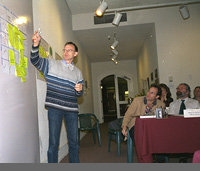| |
For Immediate Release
Susan Barich
Director of Communications
Silicon Valley World Internet Center
650-462-9800
barich@worldinternetcenter.com
Open standards, open minds
How open standards drive the growth of the Internet
By Dr. Venilde Jeronimo, director of programs at the Silicon Valley World Internet Center.
We all know what the Internet has done to bring about the New Economy. Built upon a shared agreement of how to interact and interconnect that does not advantage any one particular technology or organization, the Internet allows us to connect, interchange simple information, present that information, and do simple transactions. Clearly, the Internet is going to be used in much more sophisticated ways to conduct and transact business in the future. At a recent Think Tank Session held at the Center on The Role of Open Standards in the Expanding eBusiness Economy, 25 Internet-savvy executives were asked about the role of open standards in the New Economy.
Scott Hebner, IBM’s director of eBusiness marketing, noted during his keynote that "the Internet is like the rings of a tree." As the Internet is applied to more sophisticated uses, the functionality of the platform continues to grow. As a result, applications grow around the Internet like rings around a tree.
Hebner said that as the Internet becomes more sophisticated and more functional, it has to continue to be based on open standards. As soon as one of the rings becomes a proprietary control point, the growth of the Internet is choked off. If one vendor comes out with a technology that is a control point, that is not vendor-neutral and community-adopted, some other company comes out with a competing product or technology. As a result, the Internet turns into a battleground of control points and we may well end up back in the 1980s, making choices about presentation and format, ending up with fragmentation of the whole economy.
Most participants at the session stressed the importance of Internet functionality, specifically the need for open standards and for software and hardware vendors to work together. Sustaining open standards, however, presents many difficulties. Roy Fielding, chairman of the Apache Software Foundation, identified several challenges to be overcome: the ability to enable differentiation without breaking the standard; being able to design for evolution; evolving the protocol while maintaining the standard; dealing with the first-mover advantage, including ownership and who sees it first; balancing open access and rights, that is, unequal rights to change the specification but equal rights to express one’s opinion and decide who is right in the design area of a protocol; and facing government regulations, including encryption and trans-border governmental issues.
If we accept that open standards are pivotal to the expanding Internet Economy, what will facilitate the sustainability of open standards? Of the factors identified at the session, new business models topped the list. Technology-based models based on proprietary standards are part of the "old" economy. The New Economy is service-driven and a new ecosystem of economic models is necessary, and evolving, to incorporate open standards but also to maintain sound revenue models. Keeping users and customers involved in the loop and throughout the open process is also key.
XML is a perfect example of users being involved with and, thus, understanding the value of inter-operating across systems. Open standards provide the foundation to support the quickening pace of innovation and technological change. Standards will be left behind if they are not open. Getting companies and governments to come to this understanding is yet another problem. Other challenges include the need for an overall paradigm shift in the way that we look at a company’s "knowledge" as a competitive advantage in a service-based model of the New Economy. As articulated by Cliff Miller, chairman of TurboLinux, Inc., "when software was closed and proprietary, it was seen as a product; when it is open, it is seen as a service." Today a company’s competitive advantage is its service-its specific domain knowledge.
Open source, as opposed to open standards, was the focal point of one of the last discussions of the day. With participants agreeing to disagree about definitions of open source and open standards, participants identified the top factors in choosing open versus proprietary software. The most important factors were money (revenue versus development costs), trust, time-to-market, control/enhance and security, followed by responsiveness, scale, standards, and choice branding.
Participants closed out the Think Tank Session by reinforcing the need for open standards in order to propel the New Economy forward. Of course, the biggest challenge of all may be to create a paradigm shift in the ways that individuals and companies think about "knowledge" as a service and, thus, a vehicle for growth and prosperity.
| Based in Palo Alto, the SILICON VALLEY WORLD INTERNET CENTER is a dynamic think tank and showcase focusing on the advancement of Internet-related markets and technologies through the collaborative exchange of knowledge. Link: www.worldinternetcenter.com. |
 |
|

